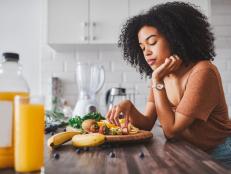Do You Really Need to Count Calories?
Why it's important to listen to your body instead of obsessing over calorie counts, according to a dietitian.

Xsandra/Getty Images
The practice of tracking food and nutrients throughout the day can create obsessive habits that take away from the pleasurable experience of eating. Years ago as a nutrition student, I remember using a calorie counting app and the recommended ranges provided were way below what I felt I needed. I was left feeling hungry and let’s just say my membership didn’t last very long. In retrospect, I can see how calorie counting apps (and counting calories, in general) put people at a higher risk for disordered eating if there’s a disconnect between what your body needs and what the app is telling you to eat. As a dietitian who helps people eat more intuitively, I try to encourage the use of internal cues paired with nutrition education as an alternative to calorie counting or food tracking. Here's why.
How Calorie Counting Apps Work
Calorie counting apps are marketed as a helpful way to meet nutritional needs and/or weight goals by tracking food intake, exercise, and other daily activities. Many of these apps calculate calorie and nutrient goals for users based on inputs like age, height and weight. These apps don’t account for factors that can impact energy needs like medication, pregnancy, medical conditions, mental health conditions, and more. As a dietitian, I explore the variety of factors that can impact someone’s food intake in order to offer the best nutrition advice possible — something calorie counting apps just don't do.
Can You Count Calories While Eating Intuitively?
A common intuitive eating question is whether or not it makes sense to count calories. For those of you not familiar, intuitive eating is an evidenced-based approach that helps people cultivate body trust when deciding what to eat instead of listening to external diet rules. There’s so much confusing nutrition information out there, and intuitive eating can help us quiet the noise and tune into what habits help us feel our best. Counting calories does not align with intuitive eating because instead of trusting your body to make the proper food choices, there’s an app that tells you how much you should eat in a day.
How to Eat Healthfully Without Counting Calories
If you’re interested in intuitive eating but have concerns about making informed food choices, that’s where nutrition awareness comes in. Tools like the MyPlate method are easy to use and provide a basic framework for nutrition education. MyPlate is a visual where half the plate is fruits and/or vegetables, one quarter is carbohydrates and one quarter is protein. This is a straightforward way to ensure you’re getting a range of nutrients that work together to meet your needs.
Eating at least three meals per day and making sure each meal has at least three to four food groups (protein, fat, carbohydrates, fiber) will cover basic nutritional needs for most adults. Eating a variety of foods helps with obtaining different types of vitamins and minerals, and eating consistently throughout the day will decrease the likelihood of overeating during the next meal. Foods like soda, cake and chips don’t provide the same nutritional benefits as salmon or kale. However, there is still a place for these foods because they provide us with satisfaction and pleasure, which meets an important need.
How To Tell If You’re Eating Enough
You can assess how you feel after each meal and use hunger and satiety cues to inform how much food you need to feel satisfied. For people with a history of dieting and restriction, a common clinical concern is undereating and for this reason, I want to provide minimum calorie recommendations. For sedentary adults ages 31 to 50, it is recommended women eat a minimum of 1800 calories and a minimum of 2200 calories for men. If you engage in physical activity, those needs will increase. This is not to encourage calorie counting, but because people who diet are often not meeting their minimum energy needs.
Flexibility is incredibly important during this process of building body trust because it’s not an exact formula where you punch numbers in. Through experimentation, you figure out what foods help you feel your best and ultimately, you’ll have a better understanding of your needs without the stress of tracking foods and calories throughout the day.
As a registered dietitian/nutritionist and Certified Diabetes Educator, Wendy Lopez, MS, RDN, CDCES is passionate about accessible and culturally relevant nutrition education. She is the co-host of the Food Heaven Podcast, and the co-founder of Food Heaven, an online platform that provides resources on cooking, intuitive eating, wellness and inclusion. When not working on creative projects, Wendy also provides nutritional counseling and medication management to patients with diabetes.
*This article was written and/or reviewed by an independent registered dietitian nutritionist.
Related Links:

































